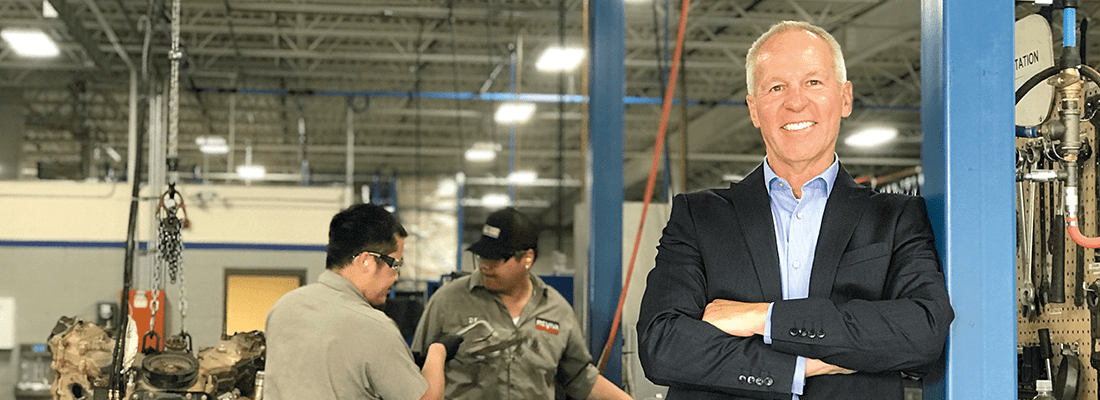Reinvention seems to be in the DNA of Reviva, an engine remanufacturer headquartered in Minneapolis, Minnesota. Its latest iteration involved adding gasoline engine remanufacturing to what had been solely a diesel engine reman operation.
So why change a successful operation? “We talk about ‘customers for life’”, says Duane Wanner, general manager of the gas engine division. “The customers we look for are not those that are looking for the cheapest engine, but rather are looking for a long-term relationship.
Part of that relationship is staying close to those customers, understanding how their needs are changing, and then evolving with those changing needs.”
In 2015, UPS approached Reviva about remanufacturing gas engines. In fact, the company asked three times about Reviva building long blocks. Initially, Reviva was reluctant because these were sold as low-price commodities and that did not fit with the company’s business model. Eventually, the international shipping group asked Reviva to take on responsibility for the gas long blocks. “They told us that we didn’t have to build them, but we had to make sure they are built to a certain recipe,” recalls Wanner.
Guarantee quality
Not only did UPS want Reviva to guarantee the quality of the long block, but it also wanted the company to turn them into drop-in engines, dynamometer test them, put them on the shelf and ship them out - the same day an order arrived.
“Once they started talking about that, we realised we were having a totally different conversation,” Wanner said. “It really wagged our tail because we are talking about value-added activity and we get excited about that. We don’t want to be just a ‘me-too’, we want to be doing value-added activity for our customers.”
To make it more challenging, UPS gave Reviva only 19 days to get a reman gas engine running on a dynamometer. By leveraging the talent, knowledge and experience of its diesel engine reman operation, Reviva was able to get the job done. When UPS returned, there was a remanufactured gas engine on the dyno.
On September 15, 2015, the company shipped its first gas engine to UPS. “It took us until the beginning of 2017 before we had fully developed their complete reman offering to take care of all their gas engines,” Wanner explained.
UPS initially was the company’s only customer for gasoline engines and this year Reviva will have shipped 10,000 units to UPS.
Since the beginning of 2019, the company has been expanding its gasoline engine customer base as the reman operation is now in its own facility in Brooklyn Center, Minnesota. Wanner, who had been corporate chief operating officer, made the decision to move to the gas engine division as its general manager, with the stipulation that the business get its own facility.
More reinvention
Interestingly, the addition of gasoline engine remanufacturing was not the first time the company had to reinvent itself. Reviva actually began life during World War II as Dealers Manufacturing, a Ford authorised remanufacturer (FAR).
Customer service
Wanner attributes the success to the services surrounding the sale including a technical telephone line that is staffed until 10pm Central Time, failure analysis, providing service bulletins and assistance with core return.
“I think there is a pricing component, but I don’t think it is the main driver.” In fact, Reviva has some diesel products that are priced higher than the original equipment manufacturer (OEM) product. “It is higher because we can get it to the customer quicker than the OE can.”
Wanner said Reviva may not always be the first call when someone needs an engine. “But when the OE tells them it is going to be three, four or five weeks to get the product and that the customer may have to change the oil pan or something else to make it fit their configuration, they call us.”
Reviva usually can ship an engine in 48 hours although gas engines usually ship same day. “Our customers are people who are using their equipment to make a living so it is all about downtime,” he says. “If we have a product that we can get to them quickly and it as good or better than the OE, price really isn’t the issue.”
If the past is any indicator of the future, Reviva will likely be able to adapt itself to changing market conditions including the move toward electric vehicles. “We are going to continue to stay close to our customers because that gives us an opportunity to see where they are heading,” Wanner concludes. “We also get to understand their pinch points and their needs going forward. We will continue to evolve with our existing customer base if that means some form of electrification or remanufacturing of batteries, or hydrogen cells or whatever it might be - there will be something in there that we will be involved with.”






